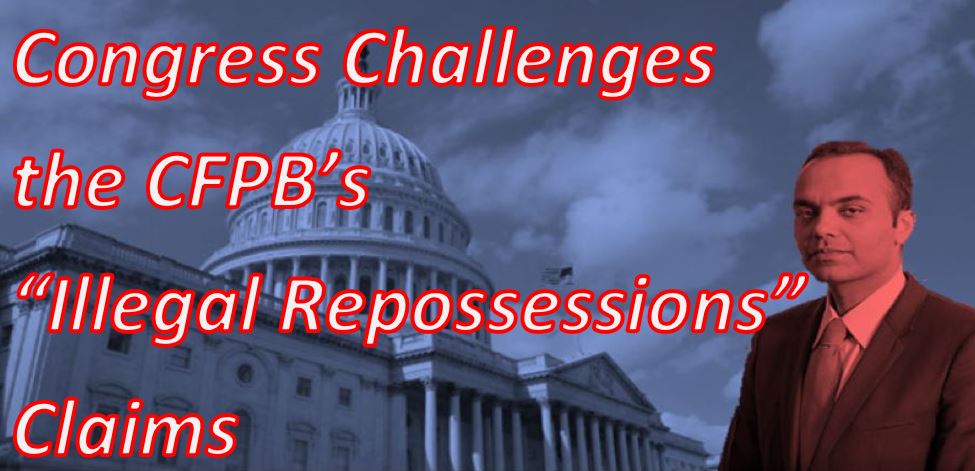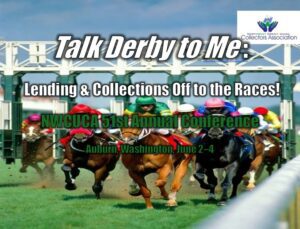
Washington DC – March 23, 2022 – Back on February 28th, the CFPB published an article on their website titled “CFPB Moves to Thwart Illegal Auto Repossessions.” In a follow up tweet, CFPB Director, Rohit Chopra posted; “No one ever wants to wake up to find that their car has been stolen. Given today’s high prices for used cars, the CFPB is taking action to thwart illegal auto repossessions by auto lenders, investors, and servicers.” Well, that didn’t sit well with eleven GOP congress persons who came forward in defense of the repossession industry and lenders.
On March 10th, they penned a joint letter to Mr. Chopra taking great exception to his broad characterization of auto lenders and repossession professionals as operating nefariously and illegally. In specific, they took aim at his tweet and his blog posts attached to the CFPB published article.
Read the Joint Congressional Letter Here!
In his posts, Chopra is accused of claiming that there was “a trend amongst auto lenders, servicers, and investors to prematurely repossess cars solely based on the increase in the price of the vehicle since the beginning of the pandemic.”
This statement seems to infer that somehow lenders make a profit on repossessions, a statement that anyone with any basic understanding of lending knows is completely untrue.
In response, the congress members stated; “,your tweet equates the repossessing a vehicle when contractually obligated payments are not made with theft. That is a gross mischaracterization that blurs the line between legal actions and the spike in crime we are seeing in cities across the U.S.”
Taking it two steps further, they challenged his statement that the pandemic spurred an increase in repossession activity by challenging Rohit Chopra to provide the following information that Members of Congress should be provided regarding auto repossessions;
• In the three years prior to the pandemic (2017, 2018, 2019), how many auto repossessions took place within the United States per each year?
• How many auto repossessions took place during the pandemic, in 2020 and 2021?
• In each year described above, please determine how many instances the CFPB found of an abusive act or practice in auto repossessions.
• In each of the above-mentioned years, how many public enforcement actions resulted from automobile repossessions.
• What historic evidence does the CFPB have that higher automobile costs correlate to illegal repossessions?
• With respect to the enforcement actions cited in the Bulletin – does the CFPB have any evidence that the illegal practices cited in these enforcement actions are widespread across the auto lending industry?
• Going forward, does the CFPB commit to resolving limited or circumstantial instances of illegal auto repossessions under your supervision function instead of leading with your enforcement arm?
In closing, they really came in strong defense of the institution of auto lending in the following statement.
“Furthermore, this letter is the latest in a recent trend from your office making disparaging and derogatory statements about legally operating businesses. As the preeminent regulator of consumer financial products, making unfounded and intentionally damaging statements is well beneath the position you hold.
While you certainly have a responsibility to protect consumers, it is important to note, as you did in a separate blogpost, “for many, their car or truck is essential to get to work or to do their work.” Absent the ability to obtain financing, many consumers would be forced to go without. It is important that you stick to the job of protecting consumers and leave behind the practice of denigrating an entire industry and the American citizens and consumers they employ.”
What brough this joint defense of the lending and repossession process is unknown. Checking with Les McCook, Executive Director of the American Recovery Association, who work closely with the repossession industry lobby “Repo Alliance” in Washington DC, he was unaware of any of this happening as the result of their efforts.
Obviously the American Bankers Association (ABA) and the two credit union association lobbies of NAFCU and CUNA carry considerable influence in DC, but I doubt even they would have desired such a pointed and direct response and challenge to Mr. Chopra and the CFPB.
Congress challenges CFPB’s illegal repossession claims – Repossession – CFPB










